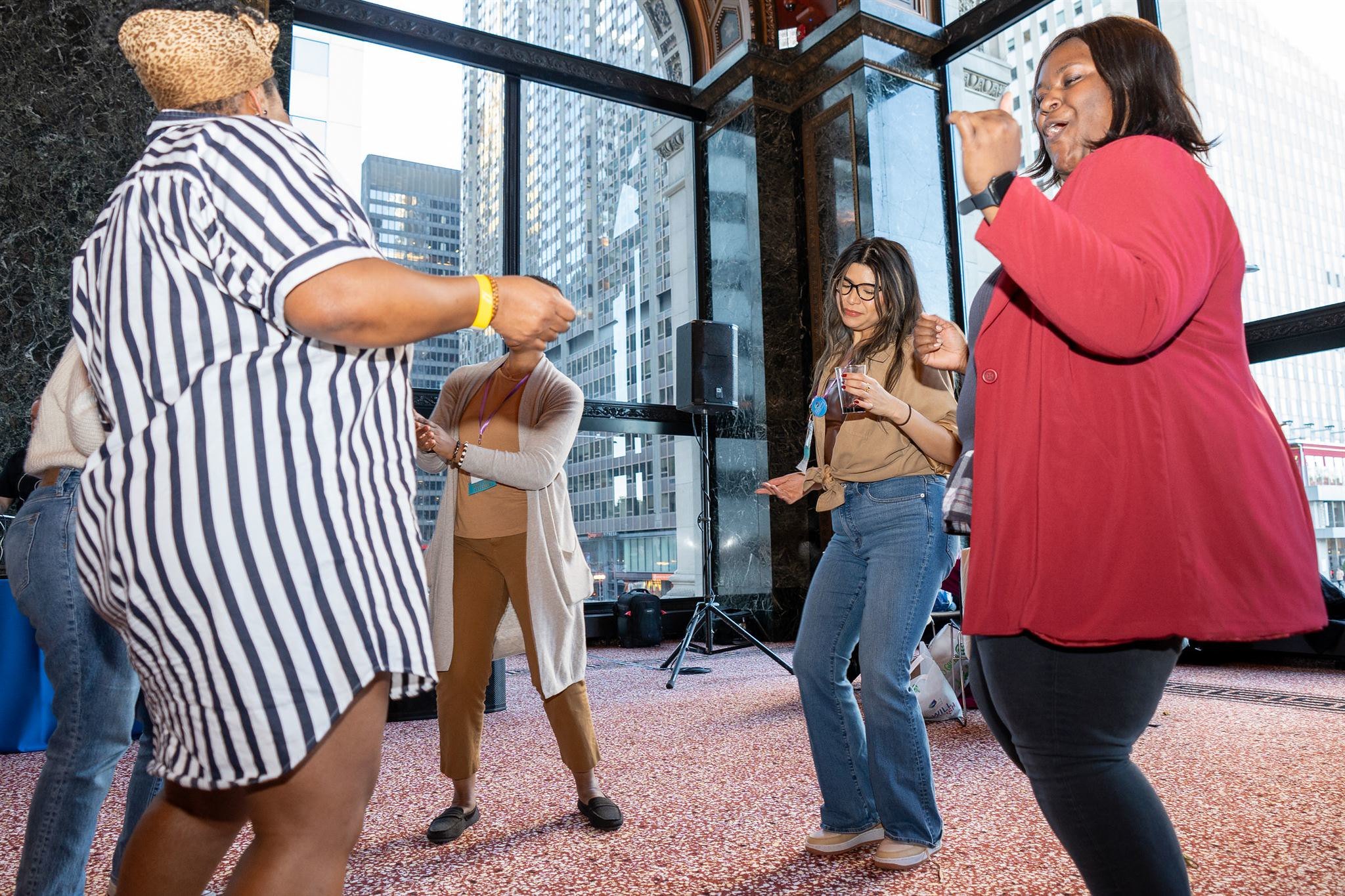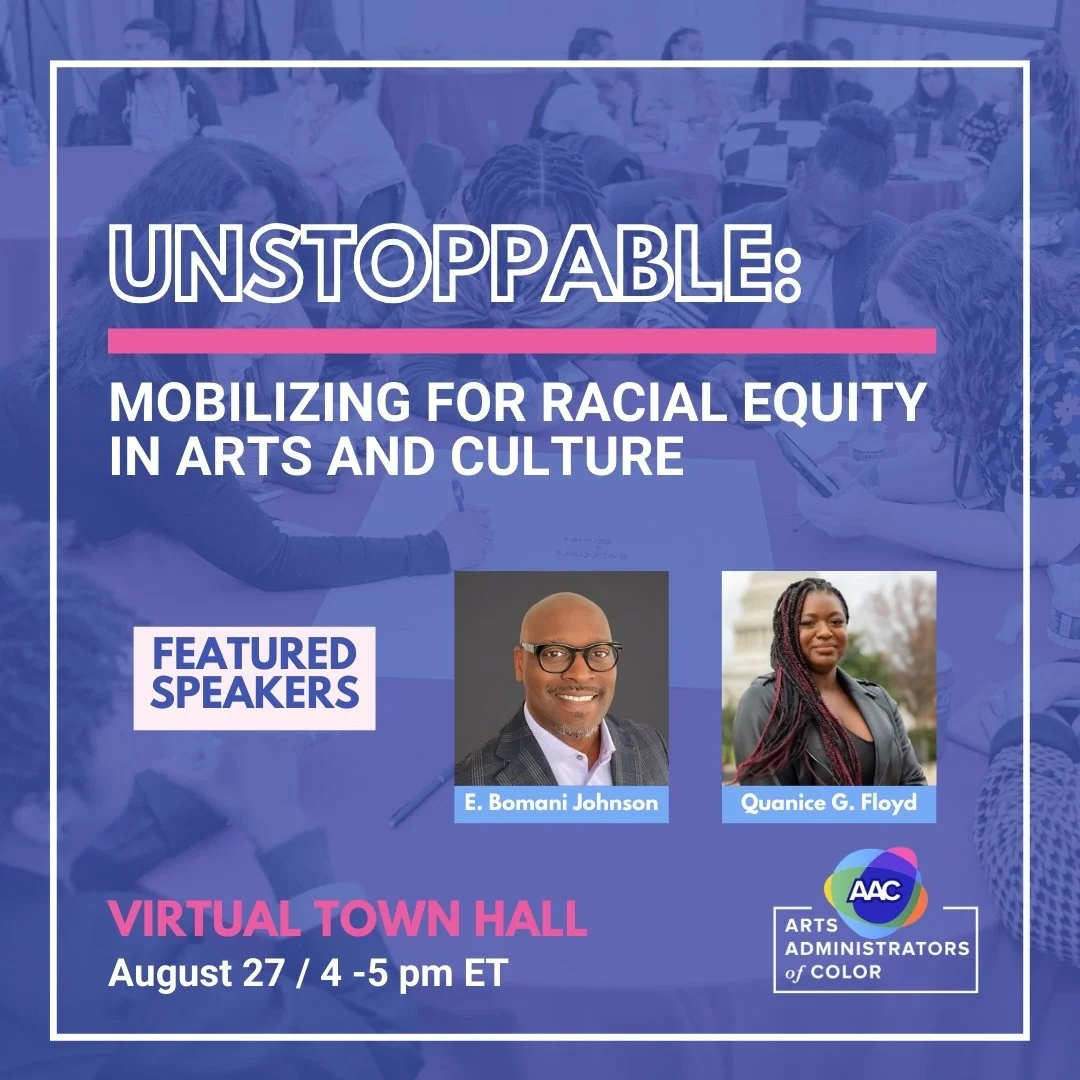Upcoming Programming and Leadership Updates
We are excited to share important news about upcoming programming and Arts Administrators of Color Network's interim leadership. Keep reading for more information.
Fall 2025 Convening
This year, we are taking a temporary pause on our annual convening to thoughtfully build a more powerful gathering in 2025. Our time together in Chicago was transformative and we look forward to bringing our convening back and gathering with you all again in Fall 2025. Be on the lookout for a save-the-date and location announcement later this year.
2024 Virtual Learning Series
In the meantime, we are excited to share that we will be launching a virtual learning series to build knowledge and skills relevant to our work as artists and arts administrators of color navigating the current political landscape while also nourishing our individual needs for healing and wellness.
Designed to support, inform, and uplift BIPOC (Black, Indigenous, People of Color) and/or Global Majority-identifying artists and arts leaders, the series will feature 90-minute workshops spread over three months to combat virtual meeting fatigue and create multiple opportunities for engagement. We’ll share news on each session’s registration launch via our newsletter.
Kickoff Town Hall: Unstoppable: Mobilizing for Racial Equity in Arts and Culture
Attacks on racial equity and DEI efforts by those who resist progress are nothing new, but the work to advance these efforts must and will continue.
Our learning series will kick off with a free town hall session responding to this crucial moment and featuring national leaders with deep expertise in racial equity, philanthropy, policy, arts advocacy, and grassroots organizing.
Featured speakers include E. Bomani Johnson, Senior Director for Special Initiatives, ABFE and Quanice G. Floyd, Executive Director, National Guild for Community Arts Education. By joining this informative session you can expect to learn about:
Recent policy efforts and court rulings affecting arts and culture organizations committed to advancing racial equity.
The impact of those policy efforts on arts and culture organizations, specifically BIPOC-centered organizations.
Current efforts to combat these attacks and strategies to safeguard arts organizations during uncertain times.
Resources to continue advancing racial equity through our work despite efforts to stall or reverse progress.
This year is a crucial election year for our country, and there is much at stake, particularly for our communities. Join us to learn how to navigate these times strategically and in solidarity.
More About the Learning Series
Registration for each session will be $25 with pay-what-you-can options available.
Track 1: Policies Impacting Artists and Cultural Workers (September)
Session 1: Policy Impacts on Individual Artists Examining policies affecting BIPOC artists and providing self-advocacy strategies (i.e. political advocacy, contract negotiation strategies, how to leverage funding, etc.).
Session 2: Policy Impacts on Arts Nonprofits Examining policies affecting nonprofits engaged in DEI and racial equity work, with strategies to support BIPOC leaders and prioritize BIPOC communities while complying with emerging policies.
Track 2: Skills-Building for Arts Management (October)
Session 1: BIPOC Lens on Alternative Funding Models Exploring alternative funding and fundraising approaches aligned with cultural practices and values.
Session 2: Powering AI in Arts and Culture Delving into AI applications in the arts, including risks and ethical considerations for arts and culture.
Track 3: Artistic Practice & Healing (November)
Session 1: Healing Through the Arts Interactive art therapy workshop, with guided art activities and discussions on creativity and wellness.
Session 2: Create Your Own Wellness Planner Creating personal wellness planners, fostering reflection, creativity, and habit cultivation with community support.
*Titles and descriptions subject to adjustment
Interested in becoming a sponsor? Click here to learn more.
Interim Leadership Update
To lead AAC through this current period, the Board of Directors has appointed Erika Hawthorne to serve as Interim Executive Director.
Erika has been serving as our Director of Advancement since September 2023 and has been engaged deeply with AAC since its founding.
Erika started as a mentee in the inaugural AAC mentorship program, volunteered on AAC’s first steering committee, and shortly after became a member of AAC’s founding Board of Directors. Erika was chair of the Governance and Human Development Committee and co-led the development of the organization's inaugural strategic plan and financial investment strategy as a member of the Executive Committee. She also secured funding as the organization's lead grant writer, co-chaired 2019’s Annual Convening, and has supported numerous AAC programs. We are grateful to have her on the team to leverage her extensive history with the organization during this time of transition. Learn more about Erika on AAC's website.
Continued Reflection and Learning
Transitioning from a volunteer to a staff-led organization has brought humbling lessons that we are continuing to process. We are eager and excited to continue serving our community even as we learn and grow.
As we look ahead, Erika has already begun to outline a path towards enhanced infrastructure in preparation for the next permanent leadership of the organization, as well boosting our programmatic offerings to ensure we are meeting your needs.
As we work to evolve our programs and develop brand new offerings for our community, please don’t hesitate to reach out to Erika to explore partnership opportunities.
AAC has always been and will continue to be a place that is for us, by us, and about us!
In community,
Daniel Guzman, Co-Chair
Stacey Williams, Co-Chair
Arts Administrators of Color Board





